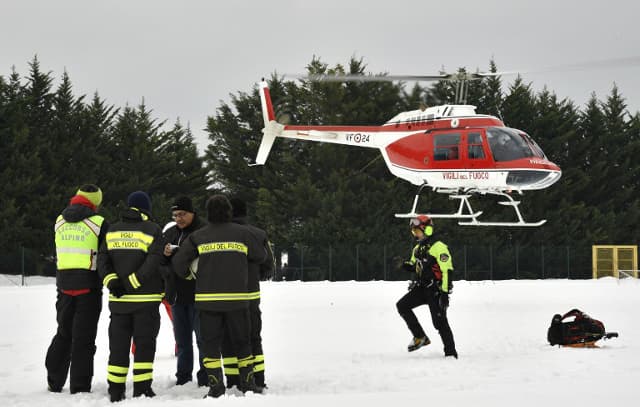Avalanche victims 'died of impact, not hypothermia'

Results of autopsies on the victims of Italy's deadly avalanche have revealed how the 29 people died.
Almost all of the victims died of impact as soon as the avalanche hit, judges said on Tuesday - news which will be bittersweet to relatives who feared that their loved ones may have suffered for several days trapped under the snow.
The final bodies were not recovered until a week after the snowslide, as rescuers dug through snow, often by hand, in what the Italian fire service's head of emergency and rescue said was "one of the most complex operations we have ever managed."
The four-storey hotel collapsed almost entirely, with only the cellars and spa left intact, in the avalanche which followed a series of four earthquakes and heavy snowfall. This combination of events left the building difficult to reach by both land and air, and phone communications had been cut off.
In some places, eight metres of snow had been dumped on the top of the building after the snowslide which police said had a force equivalent to 4,000 trucks.
Legal doctors have 60 days to deliver the results of the autopsies, but judiciary authorities said that all the deaths occurred within a short space of time. Impact trauma and asphyxia were the main causes of death, with most victims apparently immediately knocked unconscious by the force of the snow, and dying shortly afterwards.
The only exceptions were two employees of the hotel, named as Gabriele D'Angelo e Alessandro Giancaterino, who doctors believe died primarily of exposure.
Some of the victims were found with their mobile phones in their hands, seemingly waiting for signal to return so they could call for help. The majority were gathered in the hall, while staff were also stationed in the kitchen and at the hotel's reception.
An investigation has been opened to determine if more could or should have been done to prevent the disaster, particularly after it emerged that initial calls for help were dismissed as a hoax. The first emergency vehicles were not dispatched until almost two hours after the avalanche struck.
Comments
See Also
Almost all of the victims died of impact as soon as the avalanche hit, judges said on Tuesday - news which will be bittersweet to relatives who feared that their loved ones may have suffered for several days trapped under the snow.
The final bodies were not recovered until a week after the snowslide, as rescuers dug through snow, often by hand, in what the Italian fire service's head of emergency and rescue said was "one of the most complex operations we have ever managed."
The four-storey hotel collapsed almost entirely, with only the cellars and spa left intact, in the avalanche which followed a series of four earthquakes and heavy snowfall. This combination of events left the building difficult to reach by both land and air, and phone communications had been cut off.
In some places, eight metres of snow had been dumped on the top of the building after the snowslide which police said had a force equivalent to 4,000 trucks.
Legal doctors have 60 days to deliver the results of the autopsies, but judiciary authorities said that all the deaths occurred within a short space of time. Impact trauma and asphyxia were the main causes of death, with most victims apparently immediately knocked unconscious by the force of the snow, and dying shortly afterwards.
The only exceptions were two employees of the hotel, named as Gabriele D'Angelo e Alessandro Giancaterino, who doctors believe died primarily of exposure.
Some of the victims were found with their mobile phones in their hands, seemingly waiting for signal to return so they could call for help. The majority were gathered in the hall, while staff were also stationed in the kitchen and at the hotel's reception.
An investigation has been opened to determine if more could or should have been done to prevent the disaster, particularly after it emerged that initial calls for help were dismissed as a hoax. The first emergency vehicles were not dispatched until almost two hours after the avalanche struck.
Join the conversation in our comments section below. Share your own views and experience and if you have a question or suggestion for our journalists then email us at [email protected].
Please keep comments civil, constructive and on topic – and make sure to read our terms of use before getting involved.
Please log in here to leave a comment.